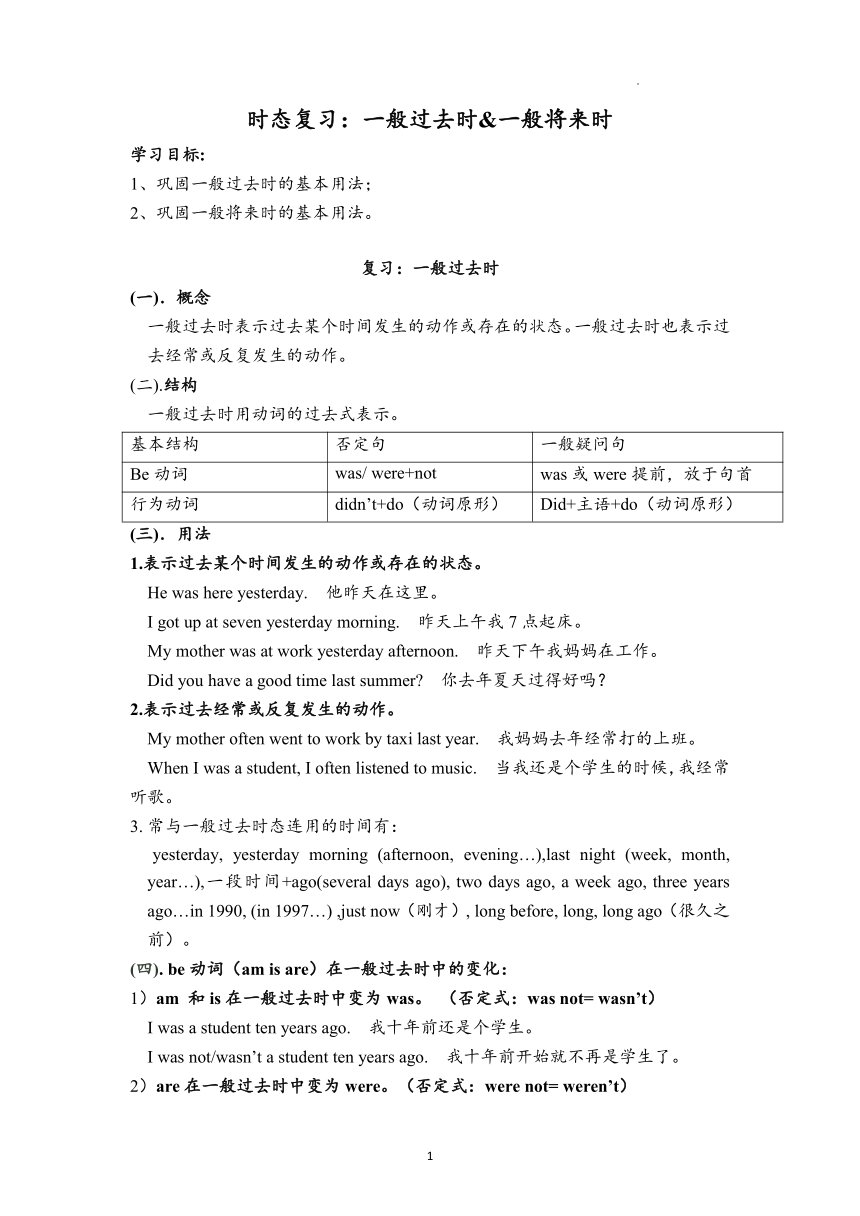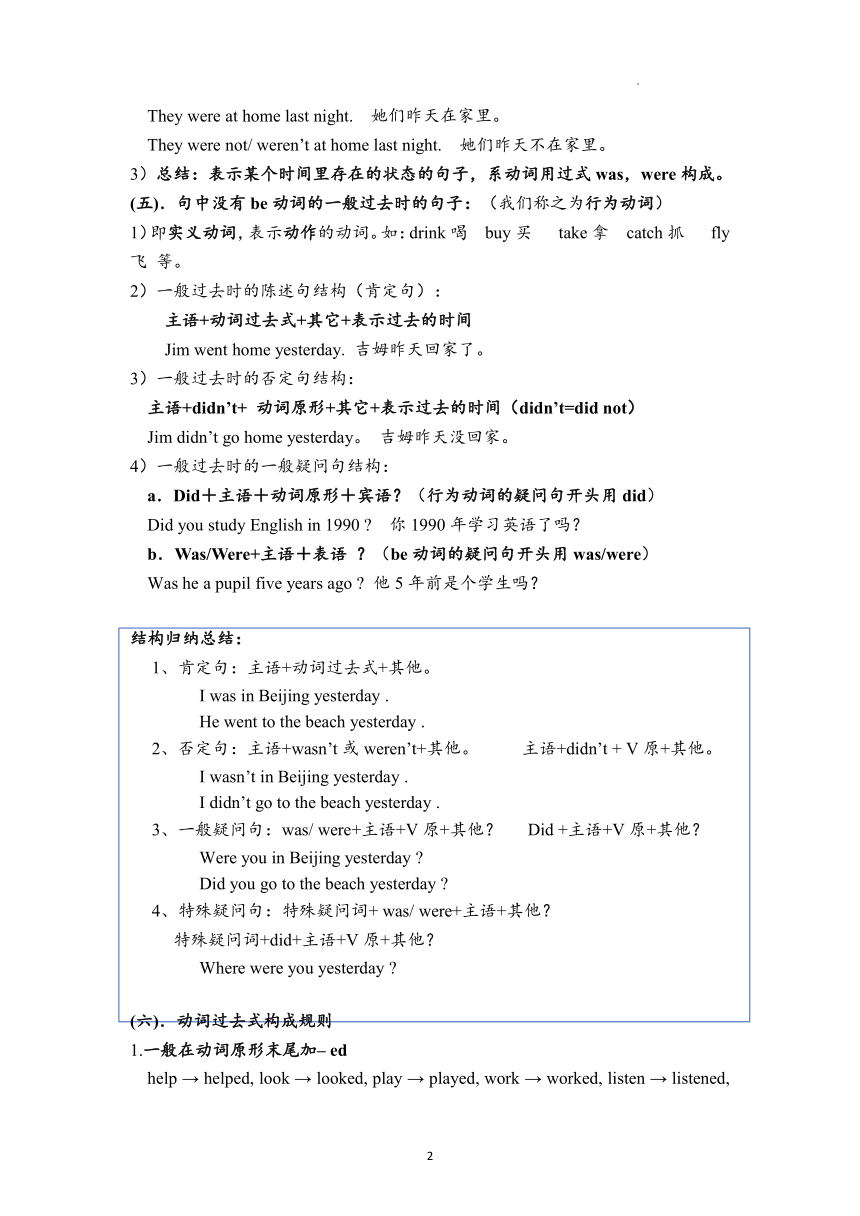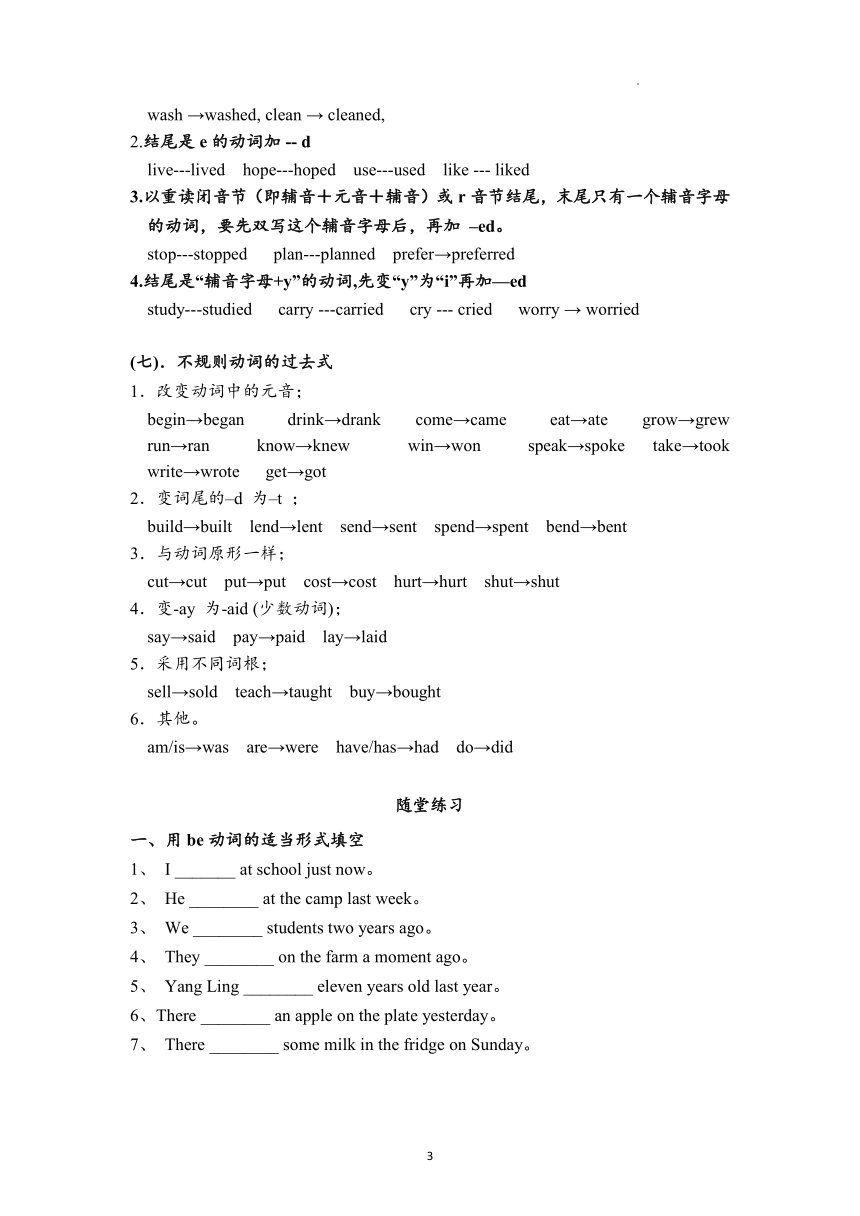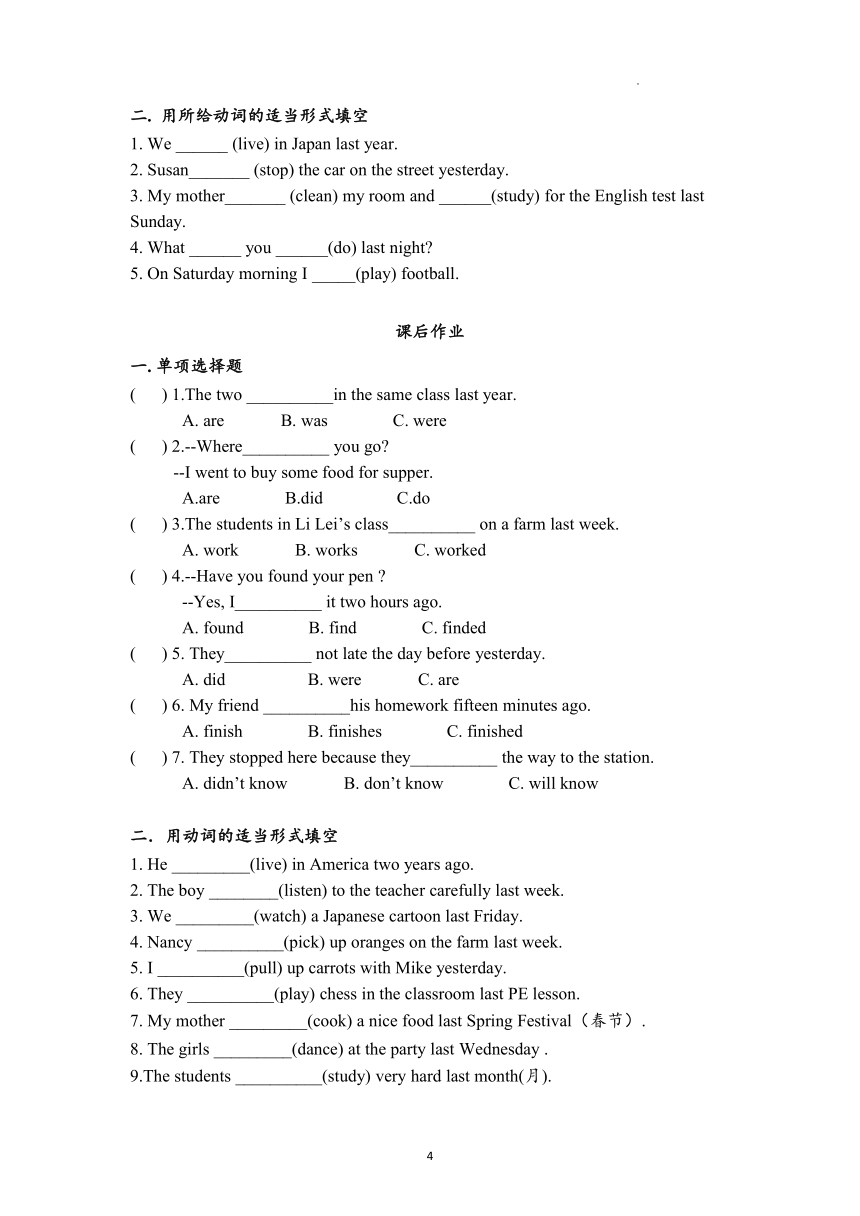2022年牛津深圳版英语中考语法复习—一般过去时&一般将来时讲义(无答案)
文档属性
| 名称 | 2022年牛津深圳版英语中考语法复习—一般过去时&一般将来时讲义(无答案) |  | |
| 格式 | docx | ||
| 文件大小 | 51.2KB | ||
| 资源类型 | 教案 | ||
| 版本资源 | 牛津深圳版 | ||
| 科目 | 英语 | ||
| 更新时间 | 2022-05-11 15:05:15 | ||
图片预览




文档简介
时态复习:一般过去时&一般将来时
学习目标:
1、巩固一般过去时的基本用法;
2、巩固一般将来时的基本用法。
复习:一般过去时
(一).概念
一般过去时表示过去某个时间发生的动作或存在的状态。一般过去时也表示过去经常或反复发生的动作。
(二).结构
一般过去时用动词的过去式表示。
基本结构 否定句 一般疑问句
Be动词 was/ were+not was或were提前,放于句首
行为动词 didn’t+do(动词原形) Did+主语+do(动词原形)
(三).用法
1.表示过去某个时间发生的动作或存在的状态。
He was here yesterday. 他昨天在这里。
I got up at seven yesterday morning. 昨天上午我7点起床。
My mother was at work yesterday afternoon. 昨天下午我妈妈在工作。
Did you have a good time last summer 你去年夏天过得好吗?
2.表示过去经常或反复发生的动作。
My mother often went to work by taxi last year. 我妈妈去年经常打的上班。
When I was a student, I often listened to music. 当我还是个学生的时候,我经常听歌。
3. 常与一般过去时态连用的时间有:
yesterday, yesterday morning (afternoon, evening…),last night (week, month, year…),一段时间+ago(several days ago), two days ago, a week ago, three years ago…in 1990, (in 1997…) ,just now(刚才), long before, long, long ago(很久之前)。
(四). be动词(am is are)在一般过去时中的变化:
1)am 和is在一般过去时中变为was。 (否定式:was not= wasn’t)
I was a student ten years ago. 我十年前还是个学生。
I was not/wasn’t a student ten years ago. 我十年前开始就不再是学生了。
2)are在一般过去时中变为were。(否定式:were not= weren’t)
They were at home last night. 她们昨天在家里。
They were not/ weren’t at home last night. 她们昨天不在家里。
3)总结:表示某个时间里存在的状态的句子,系动词用过式was,were构成。
(五).句中没有be动词的一般过去时的句子:(我们称之为行为动词)
1)即实义动词,表示动作的动词。如:drink喝 buy买 take拿 catch抓 fly飞 等。
2)一般过去时的陈述句结构(肯定句):
主语+动词过去式+其它+表示过去的时间
Jim went home yesterday. 吉姆昨天回家了。
3)一般过去时的否定句结构:
主语+didn’t+ 动词原形+其它+表示过去的时间(didn’t=did not)
Jim didn’t go home yesterday。 吉姆昨天没回家。
4)一般过去时的一般疑问句结构:
a.Did+主语+动词原形+宾语?(行为动词的疑问句开头用did)
Did you study English in 1990 你1990年学习英语了吗?
b.Was/Were+主语+表语 ?(be动词的疑问句开头用was/were)
Was he a pupil five years ago 他5年前是个学生吗?
结构归纳总结:
1、肯定句:主语+动词过去式+其他。
I was in Beijing yesterday .
He went to the beach yesterday .
2、否定句:主语+wasn’t 或weren’t+其他。 主语+didn’t + V原+其他。
I wasn’t in Beijing yesterday .
I didn’t go to the beach yesterday .
3、一般疑问句:was/ were+主语+V原+其他? Did +主语+V原+其他?
Were you in Beijing yesterday
Did you go to the beach yesterday
4、特殊疑问句:特殊疑问词+ was/ were+主语+其他?
特殊疑问词+did+主语+V原+其他?
Where were you yesterday
(六).动词过去式构成规则
1.一般在动词原形末尾加– ed
help → helped, look → looked, play → played, work → worked, listen → listened, wash →washed, clean → cleaned,
2.结尾是 e 的动词加 -- d
live---lived hope---hoped use---used like --- liked
3.以重读闭音节(即辅音+元音+辅音)或r音节结尾,末尾只有一个辅音字母的动词,要先双写这个辅音字母后,再加 –ed。
stop---stopped plan---planned prefer→preferred
4.结尾是“辅音字母+y”的动词,先变“y”为“i”再加—ed
study---studied carry ---carried cry --- cried worry → worried
(七).不规则动词的过去式
1.改变动词中的元音;
begin→began drink→drank come→came eat→ate grow→grew run→ran know→knew win→won speak→spoke take→took write→wrote get→got
2.变词尾的–d 为–t ;
build→built lend→lent send→sent spend→spent bend→bent
3.与动词原形一样;
cut→cut put→put cost→cost hurt→hurt shut→shut
4.变-ay 为-aid (少数动词);
say→said pay→paid lay→laid
5.采用不同词根;
sell→sold teach→taught buy→bought
6.其他。
am/is→was are→were have/has→had do→did
随堂练习
一、用be动词的适当形式填空
1、 I _______ at school just now。
2、 He ________ at the camp last week。
3、 We ________ students two years ago。
4、 They ________ on the farm a moment ago。
5、 Yang Ling ________ eleven years old last year。
6、There ________ an apple on the plate yesterday。
7、 There ________ some milk in the fridge on Sunday。
二. 用所给动词的适当形式填空
1. We ______ (live) in Japan last year.
2. Susan_______ (stop) the car on the street yesterday.
3. My mother_______ (clean) my room and ______(study) for the English test last Sunday.
4. What ______ you ______(do) last night
5. On Saturday morning I _____(play) football.
课后作业
一. 单项选择题
( ) 1.The two __________in the same class last year.
A. are B. was C. were
( ) 2.--Where__________ you go
--I went to buy some food for supper.
A.are B.did C.do
( ) 3.The students in Li Lei’s class__________ on a farm last week.
A. work B. works C. worked
( ) 4.--Have you found your pen
--Yes, I__________ it two hours ago.
A. found B. find C. finded
( ) 5. They__________ not late the day before yesterday.
A. did B. were C. are
( ) 6. My friend __________his homework fifteen minutes ago.
A. finish B. finishes C. finished
( ) 7. They stopped here because they__________ the way to the station.
A. didn’t know B. don’t know C. will know
二.用动词的适当形式填空
1. He _________(live) in America two years ago.
2. The boy ________(listen) to the teacher carefully last week.
3. We _________(watch) a Japanese cartoon last Friday.
4. Nancy __________(pick) up oranges on the farm last week.
5. I __________(pull) up carrots with Mike yesterday.
6. They __________(play) chess in the classroom last PE lesson.
7. My mother _________(cook) a nice food last Spring Festival(春节).
8. The girls _________(dance) at the party last Wednesday .
9.The students __________(study) very hard last month(月).
10. My parents __________(plan) to have a good weekend last Thursday.
11. We (visit) our grandparents last Sunday.
12. My grandparents (be) very happy to see us .
13.Ben (ask) his mother many questions when he was five years old.
综合练习
一.一般现在时、一般过去时练习
1.The teachers________(like)___________(dance).
2.The teacher________(like)____________(dance).
3.The students___________(speak) English in class.
4.The student_________(speak) Chinese after class.
5. Let's____________and play football . ( go )
6. He_____________ like swimming . ( not )
7. I'm sorry ____________that . ( hear )
8. Wang Bing is____________ ( write ) an E-mail to his friend .
9. He has_____________a headache . ( get )
10. _________you study English at school Yes , I___________. ( do )
11. __________your sister study English at school No , she__________ . ( do )
12. I'm _________ better . ( feel )
13. Why__________Tom absent today ( be )
14. _______ they ________ (sweep) the floor on Sunday No, they _________.
15. I _______ (watch) a cartoon on Monday.
16. We ____ (go) to school on Sunday.
17. It ____ (be) the 2nd of November yesterday. Mr White ___ (go) to his office by car.
18. Gao Shan ________ (put) the book on his head a moment ago.
19. Don't ______ the house. Mum _______ it yesterday. (clean)
20. What _________ you ______ just now I _______ some housework. (do)
二.写出下列动词的过去式
1.am/is ________ 2.do _______ 3.go ________ 4.have _______
5.isn’t _________ 6. aren’t ________ 7.spend________ 8.cook_______
9.read ________ 10.clean _______ 11.live _______ 12.study_________
三.用be动词的适当形式填空。
I _______ at school just now.
He ________ at the camp last week.
We ________ students two years ago.
They ________ on the farm a moment ago.
Yang Ling ________ eleven years old last year.
There ________ an apple on the plate yesterday.
There ________ some milk in the fridge on Sunday.
The mobile phone _______ on the sofa yesterday evening.
复习:一般将来时
(一).定义
表示将要发生的动作或存在的状态。
There will be an English party next Saturday.
We will come to see you tomorrow.
(二).结构
1、由will +动词原形构成,其will适用于各种人称,与主语连在一起时,常常缩写为’ll。变否定句时,只需在will后加not,可缩写为won’t 。在疑问句中,will需提前,构成will+主语+动词原形的结构。
He will arrive here this evening .他今晚抵达这里。
2、shall+动词原形(常用于主语为第一人称)
I shall / will not be free tomorrow .我明天没空。
3、be going to+动词原形(打算、准备做某事)
He is going to spend his holidays in London . 他打算在伦敦度假。
(三).用法
表示在将来某个时间将要发生的动作或存在的状态,常与表示将来的时间状语,如:tomorrow, next day(week/month/year...) this evening (weekend …), in the future ,
in a few minutes, the day after tomorrow , by..., soon 等连用。
I will pay a visit to Shanghai next week .
I hope you won’t be late next time .
随堂练习:
一.单项选择题。
1.—Have you finished the poster for the party
—Not yet.I______it in two days.
A.finish B.finished C.will finish
2. Robots ______more heavy work for us in the future.
A.will do B.did C.have done D.were doing
3.Students in Class One ___________ the museum next Friday.
A.visited B.visit C.will visit
4. Who ________ we ________ swimming with tomorrow afternoon
A. will; go B. do; go C. will; going D. shall; go
5. We ________ the work this way next time.
A. do B. will do C. going to do D. will doing
6. ________ you ________ free next Sunday
A. Will; are B. Will; be C. Do; be D. Are; be
7. He ________ there at ten tomorrow morning.
A. will B. is C. will be D. Be
8.--Which team do you think the game
--Hard to say. There are still ten minutes before it ends.
A. won B. will win C wins D. has won
二.用括号内所给单词的正确时态填空。
1.Sarah_________ (not be) here at ten tomorrow morning, because she_________ (go) to Beijing at that time.
2. I _________ (be) a teacher when I grow up.
3. He_________ (visit) his good friend next weekend.
4. I_________ (arrive) at the airport soon. _________ you _________ (pick) me up then
5.—_________ (be) Jenny_________ (study) in Japan
—No, she is going to study in China.
6.Tomorrow is Sunday. We________ (not have) any lessons.
7.They _________ (fly) to China at 9 o’ clock tomorrow.
三.句型转换,每空一词。
1. Are you going to have a picnic this weekend (改为否定句)
I_________ _________ _________ _________ _________ a picnic this weekend.
2. Mike will watch a famous movie on TV tomorrow afternoon. (改为同义句)
Mike_________ _________ _________ _________ a famous movie on TV tomorrow afternoon.
3. My parents will take me to Shanghai next month. (改为一般疑问句)
_________ your parents_________ you to Shanghai next month
4. I will visit the Great Wall this afternoon. (就划线部分提问)
_________ _________ you_________ this afternoon
5. He will go to the library this Friday. (改为否定句)
He_________ _________ _________ to the library this Friday.
四.根据文章内容用所给词的适当形式填空。
Sam’s birthday is on July 7th. His parents and his friends (16)_________(have) a party for him this evening. And they will give their presents for him. His friend Danny (17)_________(buy) him a football, because they both like playing football. Sam and Eliza enjoy reading books. She (18) _________(go) to the bookstore and buy a famous book for him this afternoon. Sam’s parents want to give him a special present. They (19)_________(take) him to Beijing, because Sam hopes to visit the Great Wall and eat Chinese food. If Sam knows the surprise, he (20)_________(be) very happy.
学习目标:
1、巩固一般过去时的基本用法;
2、巩固一般将来时的基本用法。
复习:一般过去时
(一).概念
一般过去时表示过去某个时间发生的动作或存在的状态。一般过去时也表示过去经常或反复发生的动作。
(二).结构
一般过去时用动词的过去式表示。
基本结构 否定句 一般疑问句
Be动词 was/ were+not was或were提前,放于句首
行为动词 didn’t+do(动词原形) Did+主语+do(动词原形)
(三).用法
1.表示过去某个时间发生的动作或存在的状态。
He was here yesterday. 他昨天在这里。
I got up at seven yesterday morning. 昨天上午我7点起床。
My mother was at work yesterday afternoon. 昨天下午我妈妈在工作。
Did you have a good time last summer 你去年夏天过得好吗?
2.表示过去经常或反复发生的动作。
My mother often went to work by taxi last year. 我妈妈去年经常打的上班。
When I was a student, I often listened to music. 当我还是个学生的时候,我经常听歌。
3. 常与一般过去时态连用的时间有:
yesterday, yesterday morning (afternoon, evening…),last night (week, month, year…),一段时间+ago(several days ago), two days ago, a week ago, three years ago…in 1990, (in 1997…) ,just now(刚才), long before, long, long ago(很久之前)。
(四). be动词(am is are)在一般过去时中的变化:
1)am 和is在一般过去时中变为was。 (否定式:was not= wasn’t)
I was a student ten years ago. 我十年前还是个学生。
I was not/wasn’t a student ten years ago. 我十年前开始就不再是学生了。
2)are在一般过去时中变为were。(否定式:were not= weren’t)
They were at home last night. 她们昨天在家里。
They were not/ weren’t at home last night. 她们昨天不在家里。
3)总结:表示某个时间里存在的状态的句子,系动词用过式was,were构成。
(五).句中没有be动词的一般过去时的句子:(我们称之为行为动词)
1)即实义动词,表示动作的动词。如:drink喝 buy买 take拿 catch抓 fly飞 等。
2)一般过去时的陈述句结构(肯定句):
主语+动词过去式+其它+表示过去的时间
Jim went home yesterday. 吉姆昨天回家了。
3)一般过去时的否定句结构:
主语+didn’t+ 动词原形+其它+表示过去的时间(didn’t=did not)
Jim didn’t go home yesterday。 吉姆昨天没回家。
4)一般过去时的一般疑问句结构:
a.Did+主语+动词原形+宾语?(行为动词的疑问句开头用did)
Did you study English in 1990 你1990年学习英语了吗?
b.Was/Were+主语+表语 ?(be动词的疑问句开头用was/were)
Was he a pupil five years ago 他5年前是个学生吗?
结构归纳总结:
1、肯定句:主语+动词过去式+其他。
I was in Beijing yesterday .
He went to the beach yesterday .
2、否定句:主语+wasn’t 或weren’t+其他。 主语+didn’t + V原+其他。
I wasn’t in Beijing yesterday .
I didn’t go to the beach yesterday .
3、一般疑问句:was/ were+主语+V原+其他? Did +主语+V原+其他?
Were you in Beijing yesterday
Did you go to the beach yesterday
4、特殊疑问句:特殊疑问词+ was/ were+主语+其他?
特殊疑问词+did+主语+V原+其他?
Where were you yesterday
(六).动词过去式构成规则
1.一般在动词原形末尾加– ed
help → helped, look → looked, play → played, work → worked, listen → listened, wash →washed, clean → cleaned,
2.结尾是 e 的动词加 -- d
live---lived hope---hoped use---used like --- liked
3.以重读闭音节(即辅音+元音+辅音)或r音节结尾,末尾只有一个辅音字母的动词,要先双写这个辅音字母后,再加 –ed。
stop---stopped plan---planned prefer→preferred
4.结尾是“辅音字母+y”的动词,先变“y”为“i”再加—ed
study---studied carry ---carried cry --- cried worry → worried
(七).不规则动词的过去式
1.改变动词中的元音;
begin→began drink→drank come→came eat→ate grow→grew run→ran know→knew win→won speak→spoke take→took write→wrote get→got
2.变词尾的–d 为–t ;
build→built lend→lent send→sent spend→spent bend→bent
3.与动词原形一样;
cut→cut put→put cost→cost hurt→hurt shut→shut
4.变-ay 为-aid (少数动词);
say→said pay→paid lay→laid
5.采用不同词根;
sell→sold teach→taught buy→bought
6.其他。
am/is→was are→were have/has→had do→did
随堂练习
一、用be动词的适当形式填空
1、 I _______ at school just now。
2、 He ________ at the camp last week。
3、 We ________ students two years ago。
4、 They ________ on the farm a moment ago。
5、 Yang Ling ________ eleven years old last year。
6、There ________ an apple on the plate yesterday。
7、 There ________ some milk in the fridge on Sunday。
二. 用所给动词的适当形式填空
1. We ______ (live) in Japan last year.
2. Susan_______ (stop) the car on the street yesterday.
3. My mother_______ (clean) my room and ______(study) for the English test last Sunday.
4. What ______ you ______(do) last night
5. On Saturday morning I _____(play) football.
课后作业
一. 单项选择题
( ) 1.The two __________in the same class last year.
A. are B. was C. were
( ) 2.--Where__________ you go
--I went to buy some food for supper.
A.are B.did C.do
( ) 3.The students in Li Lei’s class__________ on a farm last week.
A. work B. works C. worked
( ) 4.--Have you found your pen
--Yes, I__________ it two hours ago.
A. found B. find C. finded
( ) 5. They__________ not late the day before yesterday.
A. did B. were C. are
( ) 6. My friend __________his homework fifteen minutes ago.
A. finish B. finishes C. finished
( ) 7. They stopped here because they__________ the way to the station.
A. didn’t know B. don’t know C. will know
二.用动词的适当形式填空
1. He _________(live) in America two years ago.
2. The boy ________(listen) to the teacher carefully last week.
3. We _________(watch) a Japanese cartoon last Friday.
4. Nancy __________(pick) up oranges on the farm last week.
5. I __________(pull) up carrots with Mike yesterday.
6. They __________(play) chess in the classroom last PE lesson.
7. My mother _________(cook) a nice food last Spring Festival(春节).
8. The girls _________(dance) at the party last Wednesday .
9.The students __________(study) very hard last month(月).
10. My parents __________(plan) to have a good weekend last Thursday.
11. We (visit) our grandparents last Sunday.
12. My grandparents (be) very happy to see us .
13.Ben (ask) his mother many questions when he was five years old.
综合练习
一.一般现在时、一般过去时练习
1.The teachers________(like)___________(dance).
2.The teacher________(like)____________(dance).
3.The students___________(speak) English in class.
4.The student_________(speak) Chinese after class.
5. Let's____________and play football . ( go )
6. He_____________ like swimming . ( not )
7. I'm sorry ____________that . ( hear )
8. Wang Bing is____________ ( write ) an E-mail to his friend .
9. He has_____________a headache . ( get )
10. _________you study English at school Yes , I___________. ( do )
11. __________your sister study English at school No , she__________ . ( do )
12. I'm _________ better . ( feel )
13. Why__________Tom absent today ( be )
14. _______ they ________ (sweep) the floor on Sunday No, they _________.
15. I _______ (watch) a cartoon on Monday.
16. We ____ (go) to school on Sunday.
17. It ____ (be) the 2nd of November yesterday. Mr White ___ (go) to his office by car.
18. Gao Shan ________ (put) the book on his head a moment ago.
19. Don't ______ the house. Mum _______ it yesterday. (clean)
20. What _________ you ______ just now I _______ some housework. (do)
二.写出下列动词的过去式
1.am/is ________ 2.do _______ 3.go ________ 4.have _______
5.isn’t _________ 6. aren’t ________ 7.spend________ 8.cook_______
9.read ________ 10.clean _______ 11.live _______ 12.study_________
三.用be动词的适当形式填空。
I _______ at school just now.
He ________ at the camp last week.
We ________ students two years ago.
They ________ on the farm a moment ago.
Yang Ling ________ eleven years old last year.
There ________ an apple on the plate yesterday.
There ________ some milk in the fridge on Sunday.
The mobile phone _______ on the sofa yesterday evening.
复习:一般将来时
(一).定义
表示将要发生的动作或存在的状态。
There will be an English party next Saturday.
We will come to see you tomorrow.
(二).结构
1、由will +动词原形构成,其will适用于各种人称,与主语连在一起时,常常缩写为’ll。变否定句时,只需在will后加not,可缩写为won’t 。在疑问句中,will需提前,构成will+主语+动词原形的结构。
He will arrive here this evening .他今晚抵达这里。
2、shall+动词原形(常用于主语为第一人称)
I shall / will not be free tomorrow .我明天没空。
3、be going to+动词原形(打算、准备做某事)
He is going to spend his holidays in London . 他打算在伦敦度假。
(三).用法
表示在将来某个时间将要发生的动作或存在的状态,常与表示将来的时间状语,如:tomorrow, next day(week/month/year...) this evening (weekend …), in the future ,
in a few minutes, the day after tomorrow , by..., soon 等连用。
I will pay a visit to Shanghai next week .
I hope you won’t be late next time .
随堂练习:
一.单项选择题。
1.—Have you finished the poster for the party
—Not yet.I______it in two days.
A.finish B.finished C.will finish
2. Robots ______more heavy work for us in the future.
A.will do B.did C.have done D.were doing
3.Students in Class One ___________ the museum next Friday.
A.visited B.visit C.will visit
4. Who ________ we ________ swimming with tomorrow afternoon
A. will; go B. do; go C. will; going D. shall; go
5. We ________ the work this way next time.
A. do B. will do C. going to do D. will doing
6. ________ you ________ free next Sunday
A. Will; are B. Will; be C. Do; be D. Are; be
7. He ________ there at ten tomorrow morning.
A. will B. is C. will be D. Be
8.--Which team do you think the game
--Hard to say. There are still ten minutes before it ends.
A. won B. will win C wins D. has won
二.用括号内所给单词的正确时态填空。
1.Sarah_________ (not be) here at ten tomorrow morning, because she_________ (go) to Beijing at that time.
2. I _________ (be) a teacher when I grow up.
3. He_________ (visit) his good friend next weekend.
4. I_________ (arrive) at the airport soon. _________ you _________ (pick) me up then
5.—_________ (be) Jenny_________ (study) in Japan
—No, she is going to study in China.
6.Tomorrow is Sunday. We________ (not have) any lessons.
7.They _________ (fly) to China at 9 o’ clock tomorrow.
三.句型转换,每空一词。
1. Are you going to have a picnic this weekend (改为否定句)
I_________ _________ _________ _________ _________ a picnic this weekend.
2. Mike will watch a famous movie on TV tomorrow afternoon. (改为同义句)
Mike_________ _________ _________ _________ a famous movie on TV tomorrow afternoon.
3. My parents will take me to Shanghai next month. (改为一般疑问句)
_________ your parents_________ you to Shanghai next month
4. I will visit the Great Wall this afternoon. (就划线部分提问)
_________ _________ you_________ this afternoon
5. He will go to the library this Friday. (改为否定句)
He_________ _________ _________ to the library this Friday.
四.根据文章内容用所给词的适当形式填空。
Sam’s birthday is on July 7th. His parents and his friends (16)_________(have) a party for him this evening. And they will give their presents for him. His friend Danny (17)_________(buy) him a football, because they both like playing football. Sam and Eliza enjoy reading books. She (18) _________(go) to the bookstore and buy a famous book for him this afternoon. Sam’s parents want to give him a special present. They (19)_________(take) him to Beijing, because Sam hopes to visit the Great Wall and eat Chinese food. If Sam knows the surprise, he (20)_________(be) very happy.
同课章节目录
- 词法
- 名词
- 动词和动词短语
- 动词语态
- 动词时态
- 助动词和情态动词
- 非谓语动词
- 冠词
- 代词
- 数词和量词
- 形容词副词及其比较等级
- 介词和介词短语
- 连词和感叹词
- 构词法
- 相似、相近词比较
- 句法
- 陈述句
- 一般疑问句和否定疑问句
- 特殊疑问句及选择疑问句
- 反意疑问句
- 存在句(There be句型)
- 宾语从句
- 定语从句
- 状语从句
- 主谓一致问题
- 简单句
- 并列句
- 复合句
- 主谓一致
- 主、表语从句
- 名词性从句
- 直接引语和间接引语
- 虚拟语气
- 感叹句
- 强调句
- 倒装句
- 祈使句
- 句子的成分
- 句子的分类
- 题型专区
- 单项选择部分
- 易错题
- 完形填空
- 阅读理解
- 词汇练习
- 听说训练
- 句型转换
- 补全对话
- 短文改错
- 翻译
- 书面表达
- 任务型阅读
- 语法填空
- 其他资料
